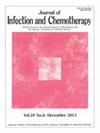2023-24年日本流感季节COVID-19 XBB.1.5与流感疫苗不良反应的比较
IF 1.5
4区 医学
Q3 INFECTIOUS DISEASES
引用次数: 0
摘要
前言:比较2023年9 - 12月最新接种的XBB.1.5单价COVID-19疫苗与季节性流感疫苗的不良反应。方法:对门诊患者进行COVID-19和/或流感疫苗接种。患者通过自我报告日记在7天内报告了5个局部和6个全身不良反应。收集分析新冠肺炎疫苗日记217篇,流感疫苗日记140篇,其中接种两种疫苗并记录日记的受试者43篇,共计314名受试者357篇日记。结果:在全身性反应中,疲倦、头痛、肌痛以新冠肺炎疫苗的发生率更高。结论:新冠肺炎疫苗与流感疫苗的不良反应组成存在显著差异,65岁及以上人群的不良反应发生率较低。本文章由计算机程序翻译,如有差异,请以英文原文为准。
Comparison of adverse reactions to COVID-19 XBB.1.5 and influenza vaccination in the 2023-24 Japanese influenza season
Introduction
Adverse reactions to the most recent XBB.1.5 monovalent COVID-19 and seasonal influenza vaccines administered from September to December in 2023 were compared.
Methods
Outpatients were administered the COVID-19 and/or influenza vaccine. Patients reported five local and six systemic solicited adverse reactions for seven days through a self-report diary. The data from 217 diaries for the COVID-19 vaccine and 140 diaries for the influenza vaccine were collected and analyzed, including 43 diaries from subjects who received both vaccines and recorded a diary, for a total of 357 diaries from 314 subjects.
Results
Among the systemic reactions, fatigue, headache, and myalgia were more frequent with the COVID-19 vaccine (p < 0.001, p < 0.01, p < 0.001, respectively). The local adverse reactions of redness and swelling were significantly more frequent with the influenza vaccine (p < 0.001 and p < 0.05, respectively). For both vaccines, most of the systemic and local reactions were less frequent in subjects 65 years or over than in those under 65. No significant increase in adverse reactions was observed for vaccinations within 14 days compared to those more than 14 days apart or the COVID-19 vaccine alone. Multiple regression analysis also showed that systemic reactions including fatigue, headache, and myalgia, to COVID-19 vaccine, were negatively correlated with age (p < 0.001, p < 0.001 and p = 0.005, respectively).
Conclusions
These findings suggest that there are significant differences between the COVID-19 and influenza vaccines in terms of the composition of the adverse reactions and there is a lower incidence of adverse reactions for persons 65 years or older.
求助全文
通过发布文献求助,成功后即可免费获取论文全文。
去求助
来源期刊

Journal of Infection and Chemotherapy
INFECTIOUS DISEASES-PHARMACOLOGY & PHARMACY
CiteScore
4.10
自引率
4.50%
发文量
303
审稿时长
47 days
期刊介绍:
The Journal of Infection and Chemotherapy (JIC) — official journal of the Japanese Society of Chemotherapy and The Japanese Association for Infectious Diseases — welcomes original papers, laboratory or clinical, as well as case reports, notes, committee reports, surveillance and guidelines from all parts of the world on all aspects of chemotherapy, covering the pathogenesis, diagnosis, treatment, and control of infection, including treatment with anticancer drugs. Experimental studies on animal models and pharmacokinetics, and reports on epidemiology and clinical trials are particularly welcome.
 求助内容:
求助内容: 应助结果提醒方式:
应助结果提醒方式:


